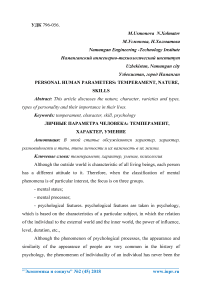Personal human parameters: temperament, nature, skills
Автор: Usmonova M., Xolmatov N.
Журнал: Экономика и социум @ekonomika-socium
Статья в выпуске: 2 (45), 2018 года.
Бесплатный доступ
This article discusses the nature, character, varieties and types, types of personality and their importance in their lives.
Temperament, character, skill, psychology
Короткий адрес: https://sciup.org/140236268
IDR: 140236268
Текст научной статьи Personal human parameters: temperament, nature, skills
Although the outside world is characteristic of all living beings, each person has a different attitude to it. Therefore, when the classification of mental phenomena is of particular interest, the focus is on three groups.
-
- mental states;
-
- mental processes;
-
- psychological features. psychological features are taken in psychology, which is based on the characteristics of a particular subject, in which the relation of the individual to the external world and the inner world, the power of influence, level, duration, etc.,
Although the phenomenon of psychological processes, the appearance and similarity of the appearance of people are very common in the history of psychology, the phenomenon of individuality of an individual has never been the same. For example, twins, similar to each other in terms of their appearance, even with their parents, differ from the sky by their inner world, their responsiveness and the variety of response reactions.
Personal qualities of a person are the following characteristics that allow an individual to differ from each other: temperament, character, skill.
The complexity of individual, naturally arising dynamic aspects of psychology is called the temperament of a person.
Temperament comes from the Latin term - the relative proportion of things. The temperament was first described by Hypoucrat, a physician who lived in the fifth century BC, Galen lived in the second century BC, Ibn Sino, who lived in the tenth century, and others. Galen first mentioned 13 types of temperament, giving an expanded classification. Later, our compatriot Ibn Sino described temperament as a pretender and said that his hot and cold type depends on the color, blood or darkness of a person. Today it is assumed that the nature of the 4th type is based on the relationship between temperament and the higher nervous system. In this case it is assumed that the temperament is similar to the classification of the ancient period. Sangwiki - the term "blood" is used to describe the action of the word "strong, strong, unbalanced".
Choleric yellow cumin is the main ingredient in the body, which is based on the rapid introduction of the impression, a strong spike and unwanted skin.
Phlegmatic - a mucosal substance in the body is characterized by a large number of phlegmatic. This person slowly takes an impression, slowly begins to work, but is able to do his work well and financially.
Melancholic is considered to be associated with black grass. This type of person is a kind of "heavy caravan", "without hesitation," an incident that occurs around people and people who are indifferent to the world, "the water of the world. These species in ancient psychology have been practiced repeatedly and persisted in these four typical names.
He is a Russian scientist. F. Lesgaft determined the properties of temperament in terms of blood and lymphatic organisms. Based on this idea, the individual characteristics of irritability of the body and the duration of the reaction to various factors depend on the speed and strength of the blood. American scientist W. Sheldon believes that the individual psychological characteristics of the 40s of the century are directly related to the characteristics of the body (various body tissues) that are controlled by the hormonal system.
Modern science considers the causes of individual differences in temperament in the brain, its cortex and subcutaneous functional properties and high properties of nerve activity.
Character and its types. Symbol marking refers to symbols, symbols and symbols. The personality of the personality is manifested in the mentality of the mental process (good memory, imagination, mental acuity, etc.) and temperament. Characteristic is the individual individuality, which is the identification and expression of personality and content, and creates typical behavior for the individual.
Individual characteristics that make up the character of a person are primarily related to the will - (courage, cowardice) and emotions (vivacity, grief, despair, etc.).
The formation of a character can be accompanied by various circumstances, depending on the level of personality development (in the family, friends, in the labor and training community, in the association association, etc.). In the reference group an individual is formed. Knowledge of the character of a person can be predetermined by how he behaves in some way, how he or she will behave in the same way.
In particular, it is necessary to take into account the nature of the students, not only their knowledge and skills, but also their distribution. Although the psychophysiological mechanism of character formation is inherent in temperament and ability, the main direction is self-awareness, self-discipline. Thus, the character is what was achieved during the person's life, is involved in the system of social relations, cooperation and interaction with other people, thereby acquiring individuality. From the history of psychology it is widely recognized that the character is based on the form, skull, face, and so on. D. Skull. Individual psychological characteristics are important in the profession of man.
Used sources:
-
1. Вигоцкий Л.Г. Проблема воли и ее развитие в детском возрасте. Собрал. Стрижка, стр. 2. М., Педагогика, 1982.
-
2. Каримова В.М. Психология. -T., 2000.
-
3. Уздабаев К. Психология пожара. -L., Nauka, 1983.
5. Психология. Учебник. Порт назначения Красный. А. Крылова. -M., 1998.
Немов Р.С. Психология -М., Просвещение. 2004.
"Экономика и социум" №2 (45) 2018
Список литературы Personal human parameters: temperament, nature, skills
- Вигоцкий Л.Г. Проблема воли и ее развитие в детском возрасте. Собрал. Стрижка, стр. 2. М., Педагогика, 1982.
- Каримова В.М. Психология. -T., 2000.
- Уздабаев К. Психология пожара. -L., Nauka, 1983.
- Немов Р.С. Психология -М., Просвещение. 2004.
- Психология. Учебник. Порт назначения Красный. А. Крылова. -M., 1998.


